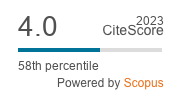Energy-efficient Routing Model Based on Vector Field Theory for Large-scale Wireless Sensor Networks
Ming Li, Huanyan Qian, Min Xu
Abstract
Routing design is a key issue for large-scale wireless sensor networks (WSNs). Energy consumption associated with allocated resources should be considered. This paper proposes the integration of an energy-efficient model, which is based on vector field theory, in large-scale WSNs. Source nodes in WSNs have the characteristics of source points in a vector field, whereas sink nodes could be characterized as gathering points. Our scheme demonstrates that we can solve a set of partial differential equations in electrostatic theory to determine the routes that result in energy efficiency. Thus, the routing problem in WSN for energy efficiency becomes a typical PDE solution. Our simulation results show significant improvement in energy consumption. Compared with the traditional shortest path approach, the proposed model shows considerable improvement in the lifetime of the network.
Keywords
(array antenna; time domain filtering; channel calibration; LMS algorith)
DOI:
http://doi.org/10.12928/telkomnika.v13i4.1847
Refbacks
There are currently no refbacks.
This work is licensed under a
Creative Commons Attribution-ShareAlike 4.0 International License .
TELKOMNIKA Telecommunication, Computing, Electronics and Control Universitas Ahmad Dahlan , 4th Campus+62 274 564604
<div class="statcounter"><a title="Web Analytics" href="http://statcounter.com/" target="_blank"><img class="statcounter" src="//c.statcounter.com/10241713/0/0b6069be/0/" alt="Web Analytics"></a></div> View TELKOMNIKA Stats


